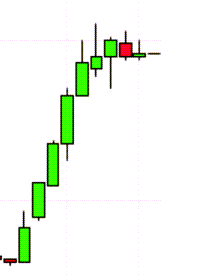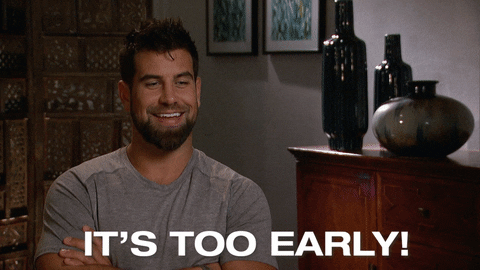Fellow list member Thomas S. wrote in with the following trading problem (shared with permission):
I am a full-time stock and futures trader for about 9 months now. Been trading 2 years. I have a subscription to Trade-Ideas.
My most frustrating problem is getting into stocks or futures too early. Being impatient. Think I just get excited.
Thomas S
This is a really common problem – I suspect that almost every trader has experienced it. I’ve seen a couple of different forms of this situation.
The Trader “Front Runs” the Setup
You see a setup forming and the candle hasn’t quite finished yet to solidify the signal. But you go ahead and enter the trade anyway because you’re almost certain it’s going to trigger when the bar closes. You might even get a better price than if you wait to be sure the signal is valid. How clever of you!

But the candle finally completes and… it turns out the signal wasn’t actually valid. The price didn’t quite close above the moving average, but just below it. Or maybe the low of the bar dipped quickly just below the bar closed which, according to your rules, invalidates the signal.
Whatever the situation – you ended up anticipating the trade instead of waiting for it. Now you’re in a position that your system didn’t think you should be in. It was close, but it didn’t quite match the rules. That’s ok, you think, it’s close enough and you just treat it as if it was a valid signal. It’s probably ok since you got that nifty price improvement on the entry. In your mind maybe that will make up for the barely imperfect nature of the setup.
Of course, you know what happens next. The trade ends up being a loser – that you shouldn’t have been in to begin with. Your trading system worked just fine – you just shot yourself in the foot.
Often this habit starts forming when you front run the entry on a trade and it actually ends up being profitable. Nothing is more dangerous than a profitable mistake when you’re trading. Be very careful when this stroke of undeserved good luck occurs.
The Trader Hasn’t Fully Defined the Trading System
Another situation where I’ve seen this occur is when a trader believes they are trading a system but the clearly defined rules for the system aren’t… so clearly defined. Losing trades are rationalized after the fact with a generic “I was too early on that one” excuse.
The question I always ask here is “How do you know you’re too early?” You need to be able to define what “too early” means just prior to entering the trade. If you can’t do that then you’re not really trading a system. If it’s clear after the trade that you were too early, then work on defining exactly what that looks like just prior to entering the trade.
Don’t be fuzzy with entry rules – clearly define them ahead of time in a way that allows you to follow them in the moment during the trading day.
If you’re trading a really fast system with a lot of trades, one thing that’s really helpful is to take a video of your screen as you trade and then review it after each day. Several years ago when computers weren’t super powerful I would set up software that would take screenshots every few seconds since a full video wasn’t technically feasible at the time. Reviewing these was very helpful in figuring out what I could do in the heat of the moment to better follow the system I was trading at the time. This allows you to become a neutral observer of yourself and creates a process of improving your trading workflow.
The Solution to Entering Trades Too Early
The best way I’ve found to convince yourself to stop entering trades too early is actually pretty simple: keep a trading journal.
Start keeping track of your trades in a journal and categorize them by the trading system you’re using. Use an additional category for trades you entered too early. Then run a report on the too-early trades. It should be very clear exactly how much your too-early trading habit is costing you. When you see data like this in such a stark form, it will be screaming at you telling you exactly what you need to do to get better. It should be very, very motivating to change the habit.
If it’s not convincing enough and you still knowingly enter trades too early, then I would take a big step back and revisit your trading goals. Why do you trade? What is it going to allow you to ultimately do and what are your steps for getting there?
Next Steps
If you want mediocre trading results by taking orders from some Ferarri-driving trading guru, stop reading.
If you’re ready to say “screw the gurus” and rely solely on yourself for your trading success, then look no further than my free weekly email newsletter.
Every week I send one actionable tip that you can apply to your trading to create a process for continuous improvement.
Screw the Ferarri-driving trading gurus by signing up below.
